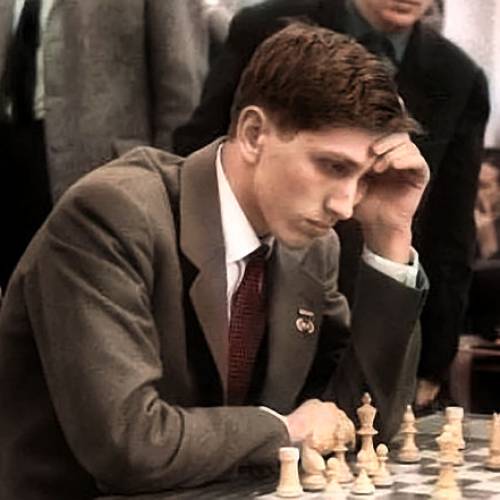 https://heaven.world/en/bobby-fischer
https://heaven.world/en/bobby-fischer
Firstname
Bobby
Lastname
Fischer
Name
Bobby Fischer
lived from:
1943-00-00
lived until:
2008-01-17
Robert James "Bobby" Fischer was an American chess grandmaster and the eleventh World Chess Champion. Many consider him to be the greatest chess player of all time. In 1972, he captured the World Chess Championship from Boris Spassky of the USSR in a match held in Reykjavík, Iceland, publicized as a Cold War confrontation, which attracted more worldwide interest than any chess championship before or since. In 1975, Fischer refused to defend his title when an agreement could not be reached with FIDE, the game's international governing body, over one of the conditions for the match. This allowed Soviet GM Anatoly Karpov, who had won the qualifying Candidates' cycle, to become the new world champion by default under FIDE rules.
Fischer showed skill at an early age. At age 13, he won a "brilliancy" that became known as "The Game of the Century". Starting at age 14, Fischer played in eight United States Championships, winning each by at least a one-point margin. At age 15, Fischer became both the youngest grandmaster up to that time and the youngest candidate for the World Championship.
At age 20, Fischer won the 1963–64 U.S. Championship with 11/11, the only perfect score in the history of the tournament. His book My 60 Memorable Games became an icon of American chess literature and is regarded a masterwork. Fischer won the 1970 Interzonal Tournament by a record 3½-point margin and won 20 consecutive games, including two unprecedented 6–0 sweeps in the Candidates Matches. In July 1971, he became the first official FIDE number-one-rated player.
After losing his title as World Chess Champion, Fischer became reclusive and sometimes erratic, disappearing from both competitive chess and the public eye. In 1992 he reemerged to win an unofficial rematch against Spassky. It was held in Yugoslavia, which was under a United Nations embargo at the time. His participation led to a conflict with the U.S. government, which sought income tax on Fischer's match winnings, and ultimately issued a warrant for his arrest. After that, he lived his life as an émigré. In 2004 he was arrested in Japan and held for several months for using a passport that had been revoked by the U.S. government. Eventually, he was granted an Icelandic passport and citizenship by a special act of the Icelandic Althing, allowing him to live in Iceland until his death in 2008.
In the 1990s, Fischer patented a modified chess timing system, which added a time increment after each move, now a standard practice in top tournament and match play. He also invented a new variant of chess named Fischerandom. Fischer made numerous additional contributions to chess.
Reykjavík (Capital Region), Iceland
https://en.wikipedia.org/wiki/Bobby_Fischer